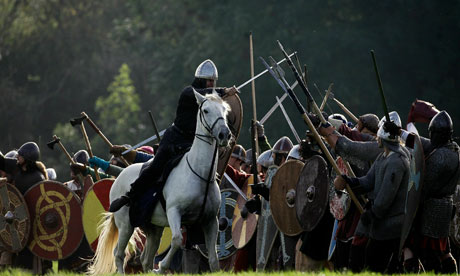The Science Delusion - Sheldrake
The Day the Universe Changed - James Burke
We must find a new way of understanding human beings

Dogs: do they really know when you're coming home? Photograph: Laurie and Charles/Getty Images
The unlucky fact that our current form of mechanistic materialism rests on muddled, outdated notions of matter isn't often mentioned today. It's a mess that can be ignored for everyday scientific purposes, but for our wider thinking it is getting very destructive. We can't approach important mind-body topics such as consciousness or the origins of life while we still treat matter in 17th-century style as if it were dead, inert stuff, incapable of producing life. And we certainly can't go on pretending to believe that our own experience – the source of all our thought – is just an illusion, which it would have to be if that dead, alien stuff were indeed the only reality.
We need a new mind-body paradigm, a map that acknowledges the many kinds of things there are in the world and the continuity of evolution. We must somehow find different, more realistic ways of understanding human beings – and indeed other animals – as the active wholes that they are, rather than pretending to see them as meaningless consignments of chemicals.
Rupert Sheldrake, who has long called for this development, spells out this need forcibly in his new book. He shows how materialism has gradually hardened into a kind of anti-Christian faith, an ideology rather than a scientific principle, claiming authority to dictate theories and to veto inquiries on topics that don't suit it, such as unorthodox medicine, let alone religion. He shows how completely alien this static materialism is to modern physics, where matter is dynamic. And, to mark the strange dilemmas that this perverse fashion poses for us, he ends each chapter with some very intriguing "Questions for Materialists", questions such as "Have you been programmed to believe in materialism?", "If there are no purposes in nature, how can you have purposes yourself?", "How do you explain the placebo response?" and so on.
In short, he shows just how unworkable the assumptions behind today's fashionable habits have become. The "science delusion" of his title is the current popular confidence in certain fixed assumptions – the exaltation of today's science, not as the busy, constantly changing workshop that it actually is but as a final, infallible oracle preaching a crude kind of materialism.
In trying to replace it he needs, of course, to suggest alternative assumptions. But here the craft of paradigm-building has chronic difficulties. Our ancestors only finally stopped relying on the familiar astrological patterns when they had grown accustomed to machine-imagery instead – first becoming fascinated by the clatter of clockwork and later by the ceaseless buzz of computers, so that they eventually felt sure that they were getting new knowledge. Similarly, if we are told today that a mouse is a survival-machine, or that it has been programmed to act as it does, we may well feel that we have been given a substantial explanation, when all we have really got is one more optional imaginative vision – "you can try looking at it this way".
That is surely the right way to take new suggestions – not as rival theories competing with current ones but as extra angles, signposts towards wider aspects of the truth. Sheldrake's proposal that we should think of natural regularities as habits rather than as laws is not just an arbitrary fantasy. It is a new analogy, brought in to correct what he sees as a chronic exaggeration of regularity in current science. He shows how carefully research conventions are tailored to smooth out the data, obscuring wide variations by averaging many results, and, in general, how readily scientists accept results that fit in with their conception of eternal laws.
He points out too, that the analogy between natural regularities and habit is not actually new. Several distinctly non-negligible thinkers – CS Peirce, Nietzsche, William James,AN Whitehead – have already suggested it because they saw the huge difference between the kind of regularity that is found among living things and the kind that is expected of a clock or a calcium atom.
Whether or no we want to follow Sheldrake's further speculations on topics such asmorphic resonance, his insistence on the need to attend to possible wider ways of thinking is surely right. And he has been applying it lately in fields that might get him an even wider public. He has been making claims about two forms of perception that are widely reported to work but which mechanists hold to be impossible: a person's sense of being looked at by somebody behind them, and the power of animals – dogs, say – to anticipate their owners' return. Do these things really happen?
Sheldrake handles his enquiries soberly. People and animals do, it seems, quite often perform these unexpected feats, and some of them regularly perform them much better than others, which is perhaps not surprising. He simply concludes that we need to think much harder about such things.
Orthodox mechanistic believers might have been expected to say what they think is wrong with this research. In fact, not only have scientists mostly ignored it but, more interestingly still, two professed champions of scientific impartiality, Lewis Wolpert and Richard Dawkins, who did undertake to discuss it, reportedly refused to look at the evidence (see two pages in this book). This might indeed be a good example of what Sheldrake means by the "science delusion".


